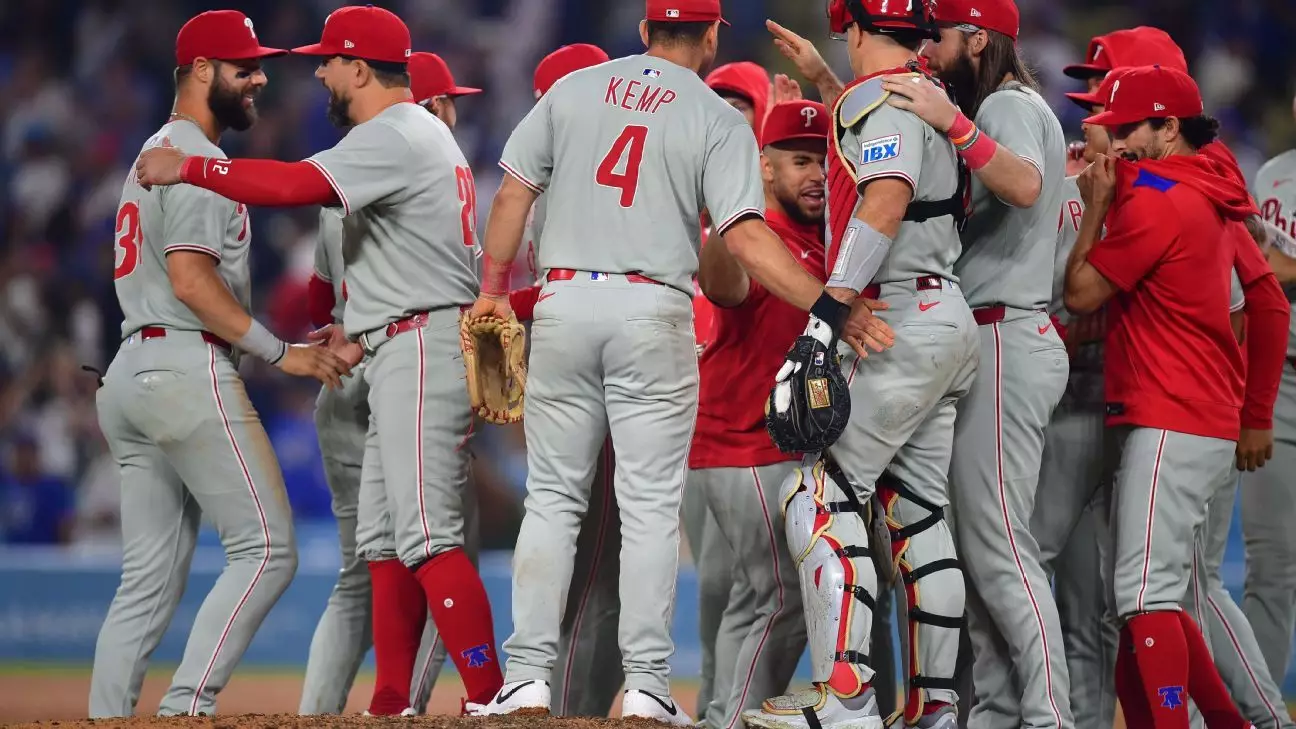The exuberance of Philadelphia Phillies’ triumph feeds a narrative of resilience and relentless pursuit, yet beneath the spirited celebration lies a web of uncertainties. Bryce Harper’s champagne-soaked spectacles and Kyle Schwarber’s boisterous beer chugging embody a team reveling in its moment of glory, but do these outward displays of joy genuinely reflect a stable, sustainable squad? Celebrations often serve as a social armor, masking fragility in the face of the grueling postseason grind, and this enthusiasm, while contagious, can obscure lingering doubts about the team’s depth and durability.
At first glance, the Phillies seem unstoppable; they clinched the earliest NL East division title in franchise history, right on schedule ahead of the looming playoffs. However, their recent performances reveal a team navigating choppy waters. The Phillies needed an intense, dramatic 10-inning victory against the Dodgers—an elite team with a World Series pedigree—to secure their spot. The fact that they blew multiple one-run leads suggests volatility, a susceptibility to inconsistency that could come back to haunt them in high-stakes postseason moments. Celebratory images on the field must be balanced with the recognition that this team has shown resilience, but also fragility when confronted with pressure.
The team’s narrative is heavily built on overcoming adversity—losing ace Zack Wheeler to injury, adjusting to roster changes, and rallying against formidable opponents. While these stories foster a sense of grit, they might also mask deeper issues: a pitching staff that has been taxed, an overreliance on clutch homers, and a defense that has occasionally floundered under pressure. If the Phillies are to become true contenders, they need not only resilience but also consistency. The thrill of their victories shouldn’t overshadow the fact that multiple close games—like blowing leads—highlight areas in need of serious improvement.
Questionable Optimism and Overconfidence
Look past the jubilant scenes, and a more skeptical perspective emerges. Postseason baseball is often a different realm altogether, where momentum is fragile, and teams are judged by their ability to perform under immense pressure rather than regular-season highlights. The Phillies’ recent track record shows a team that, despite a promising 29-14 since the trade deadline, remains vulnerable. Their main weapons—powerful homers from Schwarber and Harper—are exhilarating but also indicative of a potentially narrow offensive approach. Baseball’s unpredictability means relying too heavily on the long ball can be dangerous, especially in high-pressure postseason situations when pitchers clamp down and traditional analysis reasserts itself.
Furthermore, questions linger about the durability of their key players. Trea Turner, currently sidelined, and Alec Bohm, battling injuries, suggest that the team may face injury-related setbacks as the season intensifies. Depth, which has proved essential during their winning streaks, might not be sufficient if their core stars falter. The Phillies have demonstrated resilience, but sustaining this over a grueling postseason schedule remains a significant challenge, especially given the physical toll of a compressed schedule and high-stakes games.
The managerial accolades of Rob Thomson, now the third in franchise history to secure consecutive division titles, also warrant cautious optimism. A coach’s role in navigating successful postseason runs is pivotal, yet the team’s ability to adapt tactically when faced with the best competition remains to be seen. History has shown that even well-managed teams can falter if their players don’t perform collectively under heat. The current roster has the pieces to succeed, but whether they can translate regular-season resilience into postseason excellence is an open question.
Is the Franchise Entering a False Summit?
As impressive as the Phillies’ rise appears, there is an underlying fear that this so-called golden moment might be an overreach—a fleeting peak rather than a sustainable ascent. Building around power hitters and relying on a resilient team identity has served them well this season; still, these are strategies that may not sustain in the postseason’s unpredictable terrain. The team’s current form, buttressed by key trades for players like Harrison Bader and Jhoan Duran, points to a deliberate effort to diversify their tactical approach.
However, their overall roster composition raises doubts. Injuries to core players indicate a thin margin for error. A team that has advanced by exceptional moments could quickly unravel if key contributors are sidelined, revealing a fragile foundation masked by their recent successes. Their aggressive fightback, while commendable, often highlights a reactive rather than proactive style—dictated by necessity rather than strategic confidence.
Despite manager Thomson’s claims of enjoying the most exciting four years of his career, it’s worth pondering whether the team’s current momentum is sustainable or merely a fortunate streak. Baseball’s postseason is as much a mental game as it is physical; overconfidence bred from exuberant celebrations can lead to complacency, and underestimating opponents can prove fatal. The Phillies’ hopeful fans must balance their enthusiasm with the sobering reality that baseball’s true test lies ahead—one where resilience alone may not be enough.
The narrative of a team “playing really good baseball” is compelling, yet it must be tempered with humility. The challenge now is translating their heart and grit into disciplined execution, strategic mastery, and injury management. Without these, even the most passionately celebrated teams can become cautionary tales of overconfidence and fleeting success. The Phillies are undeniably on an exciting trajectory, but the shadows of doubt remind us that in baseball, the line between victory and defeat is razor-thin, especially when one’s applause can sometimes drown out the need for careful self-critique.


Leave a Reply